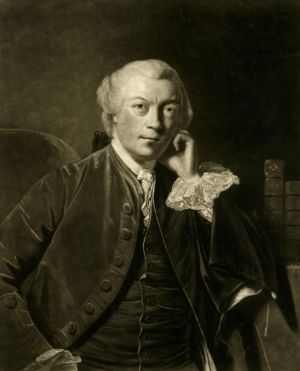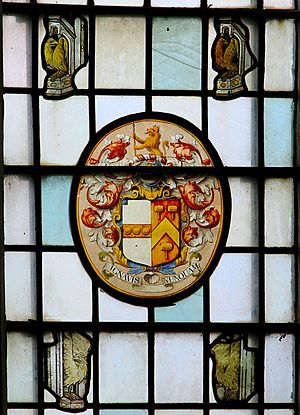Soame Jenyns facts for kids
Quick facts for kids
Soame Jenyns
|
|
|---|---|

Portrait from 1776
|
|
| Born | 1 January 1704 London, England
|
| Died | 18 December 1787 (aged 83) London, England
|
| Occupation | Writer, politician |
| Spouse(s) |
Mary Soame
(m. 1726; died 1753)Elizabeth Gray
(m. 1754) |
| Parent(s) |
|
Soame Jenyns (born January 1, 1704 – died December 18, 1787) was an English writer and a Member of Parliament. This means he was elected to help make laws for the country. He was one of the first people to speak up for treating animals kindly.
Contents
Life and Political Career
Soame Jenyns was born in London. His father was Sir Roger Jenyns. Soame went to St John's College, Cambridge for his education.
In 1742, he became a Member of Parliament (MP) for Cambridgeshire. This was where his family home, Bottisham Hall, was located. He later represented other areas like Dunwich and Cambridge. From 1755 to 1780, he worked as a commissioner for the Board of Trade. This board helped manage trade and colonies for Britain.
Soame Jenyns' Writings
Soame Jenyns was known for his writing during his lifetime. This was partly because he was wealthy and well-known. However, he also had real talent.
Early Poems and Books
His early poems included Art of Dancing (1727) and Miscellanies (1770). These works were often lively and graceful.
His first major prose work was Free Inquiry into the Nature and Origin of Evil (1756). This book explored why bad things happen in the world. It was strongly criticized by another famous writer, Samuel Johnson. Johnson thought the book was too simple for such a big topic. Jenyns was quite annoyed by Johnson's review. He even wrote a sarcastic poem about Johnson after he died.
Views on Christianity
In 1776, Jenyns published View of the Internal Evidence of the Christian Religion. Earlier in his life, he had some doubts about traditional religion. But by this time, he had returned to believing in Christianity. He argued that Christian beliefs made sense and agreed with human reason. Many people praised this book for its good writing.
Advocacy for Animals
Jenyns published another important work called Disquisitions on Several Subjects in 1782. In one part of this book, he wrote about animals. He believed that humans should treat animals with kindness, just as we would want God to treat us. He famously said: "We are unable to give life, and therefore ought not wantonly to take it away from the meanest insect, without sufficient reason; they all receive it from the same benevolent hand as ourselves, and have therefore an equal right to enjoy it." This showed his strong belief that all living things deserve to live.
Family Life and Marriages
Soame Jenyns was married two times, but he did not have any children.
- His first wife was Mary Soame. She was the daughter of Colonel Edmund Soame.
- His second wife was Elizabeth Grey.
Death and Legacy
Soame Jenyns passed away in London on December 18, 1787, due to a fever. He was buried at the church of the Holy Trinity in Bottisham. Since he had no children, his cousin, George Leonard Jenyns, became his heir.
A collection of Soame Jenyns' writings was published in 1790. His work is also mentioned in James Boswell's famous book about Samuel Johnson.
 | William M. Jackson |
 | Juan E. Gilbert |
 | Neil deGrasse Tyson |


